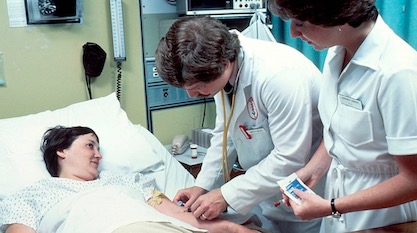 Medicine
Medicine
Physicians Should Prescribe Pills, not Politics


They want to politicize everything! Now, in the name of promoting “health,” doctors are urged to engage their patients about politics.
At least, that’s the gist of a column in the New York Times by Bellevue Hospital physician and NYU Medical School professor Danielle Ofri, who argues that since part of a doctor’s work entails helping patients live healthy lifestyles, physicians should therefore engage their patients politically in the clinical setting to highlight policies (liberal, of course) that she sees as germane to that effort.
A Prescription for Politics
From “Doctors Should Tell Their Patients to Vote” (my emphasis):
Suddenly, like Dr. Virchow [a 19th-century German doctor who wrote a report castigating public policies he believed responsible for a typhus epidemic], we are recognizing that our purview extends to the entire structure of our society and that politics is, as he put it, “nothing else but medicine on a large scale.”
Political decisions that affect insurance coverage, access to medical care, housing, minimum wage, immigration law, water sources — just to name a few examples — exert medical effects that are comparable with those of major diseases. Just ask the people of Flint, Mich.…
Now, as our society feels increasingly fractured, the health threats seem even more alarming. Growing income inequality, disregard of environmental hazards, and the undermining of social safety nets all stand to harm our patients’ health. Dr. Virchow’s words from 170 years ago about the creep of religion into state affairs, the outsize power of the wealthy and the autocratic impulses of government feel unsettlingly contemporary.
Doctors have every right to — and should — engage individually and collectively in the political life of the nation. But should that extend to their interactions with individual patients in the clinical setting? Apparently so:
So is it time for doctors to pull out our prescription pads and, like Dr. Virchow, start prescribing democracy?
This may seem like a radical extension of the medical mandate, but the poorer and the sicker our patients are, the more likely they are to be disenfranchised. Those with the most to lose are least likely to have their voices heard.
Of course no one should be advocating political viewpoints in the exam room — patients need a neutral, nonjudgmental atmosphere to feel secure. But civic engagement is nonpartisan.
“Viewpoints” in the Exam Room?
Considering the repeated examples she gives of the political issues doctors should address with patients — and the apparent approach she believes they should promote — does anyone believe her disclaimer that “viewpoints” would not be advocated in the exam room? I don’t. And frankly, neither does she:
When patients say they can’t afford their medicine, fear being bankrupted by medical bills, or struggle to find treatment for an addiction, we typically offer sympathy for these heartbreaking and seemingly intractable issues.
But might it be our responsibility to point out that these problems are not just bad luck but also the result of political decisions?
Ofri wants hospitals to become centers of voter registration:
When patients are admitted to the hospital, they are asked about their tobacco use and their flu shots, their employment status and their religious affiliation. Why not ask if they are registered to vote? Just as hospitals and clinics help the uninsured obtain coverage, they should also help eligible voters register.
Is she kidding? The last thing sick people need while being admitted to a hospital is a nurse or clerk trying to get out the vote.
No. I don’t want to be harangued by my doctor about politics during a physical. I don’t want my doctor asking me if I have guns or preaching to me about firearms policy (as some have urged they do). I don’t want to hear my doctor pontificating about the Affordable Care Act or what our public policy should be about the opioid epidemic. All of that would happen inevitably once politics enter the exam or treatment room.
Photo: Doctor draws blood while explaining the importance of voter registration, by Linda Bartlett [Public domain], via Wikimedia Commons
Cross-posted at The Corner.
